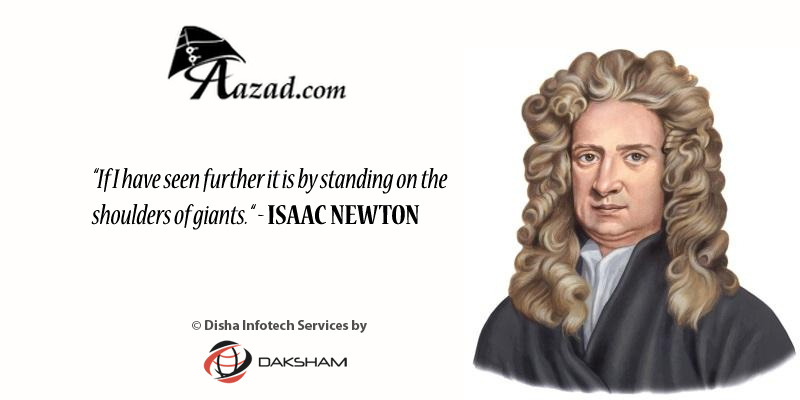- ●Breakthroughs in Prostate Cancer Treatment: What Every Patient Should Know
- ●Ovarian Cancer: The Silent Disease Women Cannot Ignore
- ●Children and Blood Cancer: Why Awareness is Crucial
- ●Women in Aviation India commences the celebration of 10th Girls in Aviation Day
- ●2025 Announcement, Appointment of New Board to Lead Hindustan National Glass & Industries Ltd
Isaac Newton

Isaac Newton(1642-1727) was one of the most brilliant of all scientists. He has given great contributions to science, especially in the field of mechanics and optics. He is considered as the father of classical mechanics. Born in a manor house of Woolsthorpe, (located near Grantham in Lincolnshire), where he attended school, he entered Cambridge University in 1661; he was elected a Fellow of Trinity College in 1667, and Lucasian Professor of Mathematics in 1669.
He remained at the university, lecturing in most years, until 1696.At the age of 23; he left his college (due to some plague in his country). It was during this time that he started thinking about the motion of moon about the earth, and this led to the discovery of the universal law of gravitation.
Newton’s Law of Gravitation:-
Before the mid 17th centaury, it was believed that the laws governing the motion of heavenly bodies are different from those controlling that of earthly bodies. Newton, while studying the motion of moon around the earth concluded that the force required by the moon to revolve around the earth must be generated by earth itself; in other words, the earth attracts the moon. The saying goes that while sitting beneath an apple tree, when an apple fell down from the tree to the earth, it clicked to his mind that earth attracts all bodies towards it centre.
This was a revolutionary idea, both in science and philosophy, and helped to break the old rigid beliefs about the universe. Newton, through his experiments concluded that every body possessing mass has an inherit property to attract all other mass towards it. The force generated by a body (say having mass m1) on another body (mass m2) separated by a distance r is given by:
F= Gm1m2/r2; where G is the Universal Gravitational Constant [G=6.67 * 10^-11]
Newton was also bold enough to argue that every rigid body can be visualized as a single point mass, i.e., the entire mass of a body can be concentrated at its geometrical centre (called the centre of mass of the body). This was a major step in science as it not only helped in making the analysis of rigid bodies easier but also made calculations simple.
Newton’s Color Wheel:-
Newton was also the first one to prove experimentally that sunlight is composed of seven colors (violet, indigo, blue, green, and yellow, orange, red); which together combine to produce white light. He took a disc, divided it into seven equal parts and painted them with the above seven colors. He then rotated it with very high speed and observed that the seven colors could not be distinguished from one other! In fact they combined together to produce white light! This was again an important discovery in wave optics. His other major contributions in the field of optics were to propose the ‘Cospicular Theory of Light’, i.e., light rays are composed of minute particles which follow the laws of motion just like a body with finite size does.
He has also performed various experiments in interference of light rays. Besides mechanics and optics, he has formulated laws in heat transfer (Newton’s law of cooling). He wrote a very famous book ‘Principia’. He was a good mathematician too. He developed Calculus (a major branch in mathematics). He contributed the last few years of his life to explore the world of spirituality, and thus became a good scientist as well as a good philosopher.
Newton died at Kensington on 20 March 1727 and was buried in Westminster Abbey on 28 March. Newton's Monument dates from 1731. It was designed by William Kent and was executed by Michael Rysbrack.
Some Quotes by Issac Newton
- “A Newtonian explanation is: 'Science accepts that if we know the position of every molecule and atom, we can foresee everything.”
- “I keep the subject of my inquiry constantly before me, and wait till the first dawning opens gradually, by little and little, into a full and clear light. “
- “If I have ever made any valuable discoveries, it has owed more to patient attention, than to any other talent. “
- “Tact is the knack of making a point without making an enemy. If I have seen further it is by standing on the shoulders of giants. “
Isaac Newton, Letter to Robert Hooke, February 5, 1675
- “I do not know what I may appear to the world; but to myself I seem to have been only like a boy playing on the seashore, and diverting myself in now and then finding a smoother pebble or a prettier shell than ordinary, whilst the great ocean of truth lay all undiscovered before me. “
- “I was like a boy playing on the sea-shore, and diverting myself now and then finding a smoother pebble or a prettier shell than ordinary, whilst the great ocean of truth lay all undiscovered before me.”
- “No great discovery was ever made without a bold guess.”
- “I can calculate the motion of heavenly bodies, but not the madness of people.”
- “Trials are medicines which our gracious and wise Physician prescribes because we need them; and he proportions the frequency and weight of them to what the case requires. Let us trust his skill and thank him for his prescription.”
- “Errors are not in the art but in the artificers.”
- “Oh Diamond! Diamond! Thou little knowest the mischief done! (Said to a pet dog who knocked over a candle and set fire to his papers”
Quotations about Newton
- "The Principia is preeminent above any other production of human genius." - Pierre-Simon Laplace
- "Taking mathematics from the beginning of the world to the time when Newton lived, what he has done is much the better part." - Gottfried Leibniz
- "All that has been accomplished in mathematics since his day has been a deductive, formal, and mathematical development of mechanics on the basis of Newton's laws." - Ernst Mach
- "Nature and Nature's laws lay hid in night: God said, Let Newton is! And all was light." - Poem, Alexander Pope




